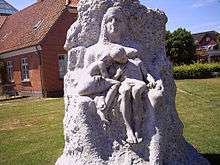Jörð

In Norse mythology, Jörð (Old Norse jǫrð, "earth" pronounced [ˈjɔrð], Icelandic Jörð, pronounced [ˈjœrð], sometimes Anglicized as Jord or Jorth; also called Jarð, [jɑrð] as in Old East Norse), is a female jötunn. She is the mother of the thunder god Thor, son of Odin, and the personification of the Earth. Fjörgyn and Hlóðyn are considered to be other names for Jörð. Some scholars refer to Jörð as a goddess.[1] Jörð's name appears in skaldic poetry both as a poetic term for the land and in kennings for Thor.
Etymology
Jörð is the common word for earth in Old Norse, as are the word's descendants in the modern Scandinavian languages; Icelandic jörð, Faroese jørð, Danish, Swedish and Norwegian jord. It is cognate to English "earth" through Old English eorðe.[2]
Attestations
Gylfaginning
In Gylfaginning, the first part of the Prose Edda, Jörð is described as one of Odin's sexual partners and the mother of Thor. She is the daughter of Annar and Nótt and half-sister of Auðr and Dagr.[3]
However, scholar Haukur Thorgeirsson points out that the four manuscripts of Gylfaginning vary in their descriptions of the family relations between Nótt, Jörð, Dagr, and Dellingr. In other words, depending on the manuscript, either Jörð or Nótt is the mother of Dagr and partner of Dellingr. Haukur details that "the oldest manuscript, U, offers a version where Jǫrð is the wife of Dellingr and the mother of Dagr while the other manuscripts, R, W and T, cast Nótt in the role of Dellingr's wife and Dagr's mother", and argues that "the version in U came about accidentally when the writer of U or its antecedent shortened a text similar to that in RWT. The results of this accident made their way into the Icelandic poetic tradition".[4]
Skáldskaparmál
In Snorri Sturluson's Skáldskaparmál, Jörð (as the personified earth) is called the rival of Odin's wife Frigg and his other giantess concubines, Rindr and Gunnlöd, the mother-in-law of Sif, Thor's wife, daughter of Nótt, and sister of Auðr and Dagr.[5][6]
Poetic Edda
In Lokasenna, Thor is called Jarðar burr ("son of Jörð").[7][8]
In the same verse in Völuspá, he is referred to as mǫgr Hlóðyniar and Fjǫrgyniar burr (child of Hlóðyn, Fjörgyn's child).[9][10] The otherwise unknown Hlóðyn was therefore another name of Jörð.[11] She is usually thought to be identical with Hludana, to whom Roman votive tablets have been found on the Lower Rhine.[12]
Notes
- ↑ Orchard (1997:98).
- ↑ "Earth" in Online Etymology Dictionary.
- ↑ Gylfaginning 10, 36.
- ↑ Haukur (2008:159—168).
- ↑ Lindow (2001:205).
- ↑ Skáldskaparmál 33 (24).
- ↑ Lokasenna 58.
- ↑ In Hárbarðsljóð 9, Thor calls himself son of Odin and brother of Meili, who therefore may also be Jörð's son.
- ↑ Völuspá 53 (56).
- ↑ Dronke (1997:22).
- ↑ Lindow (2001:206).
- ↑ Dronke (1997:150).
References
- Dronke, Ursula (1997). The Poetic Edda Volume II Mythological Poems. Clarendon Press. ISBN 0-19-811181-9.
- Haukur Thorgeirsson (2008). "Hinn fagri foldar son" as published in Gripla XIX, pages 159—168. Árni Magnússon Institute for Icelandic Studies.
- Lindow, John (2001). Norse Mythology: A Guide to the Gods, Heroes, Rituals, and Beliefs. Oxford University Press. ISBN 0-19-515382-0.
- Orchard, Andy (1997). Dictionary of Norse Myth and Legend. Cassell, London: ISBN 0-304-34520-2
